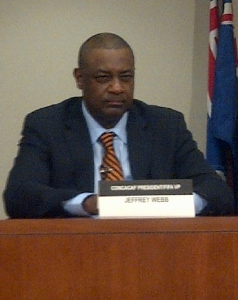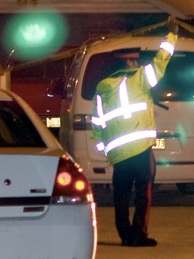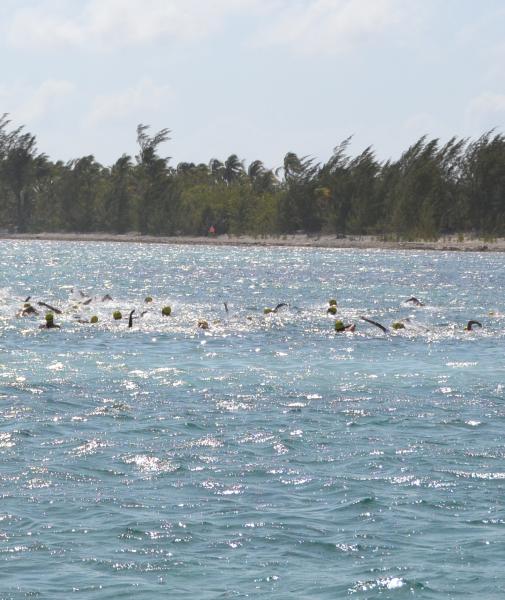Archive for May, 2012

Health officials urge cancer patients to join register
 (CNS): Patients who are being treated for cancer are being encouraged to supply information with the national Cancer Registry which was launched in 2010 by the Health Services Authority in collaboration with the Cayman Islands Cancer Society. Officials say that there is a need for accurate data to inform on trends in cancer incidence along with outcomes and quality of care. Currently, it is not mandatory for those with cancer to submit details to the registry and Cancer Registrar, Milena Conolly said that there is not enough data on the disease. “There is very little information on the number of people living with cancer or the types of cancer that are most prevalent in the Cayman Islands at present,” she said.
(CNS): Patients who are being treated for cancer are being encouraged to supply information with the national Cancer Registry which was launched in 2010 by the Health Services Authority in collaboration with the Cayman Islands Cancer Society. Officials say that there is a need for accurate data to inform on trends in cancer incidence along with outcomes and quality of care. Currently, it is not mandatory for those with cancer to submit details to the registry and Cancer Registrar, Milena Conolly said that there is not enough data on the disease. “There is very little information on the number of people living with cancer or the types of cancer that are most prevalent in the Cayman Islands at present,” she said.
“We need to know information such as the number of new cases that develop annually, the treatments and outcomes.”
Jennifer Webber, Operations Manager for the society urged people to come forward and register. “With the widening impact of cancer on the Cayman Islands community and the escalating complexity and expenses associated with treatment, accurate statistics are needed to inform the public, create healthcare policies and present actionable steps toward prevention and the reduction of cancer risks,” she said.
Conolly spoke about the important of understanding changes and developments that while help create an accurate picture of cancer incidence in the population so that interventions can be targeted. “This information can then be used to make informed public health decisions and act as a catalyst for the development of programmes designed to mitigate the risks of many types of cancers,” she said. “Data collected by the Cancer Registry can be compared with other Caribbean countries and worldwide. This comparison will give the Cayman Islands evidence of any similarities or differences experienced.
“The ability to compare data will encourage collaboration with other nations and further research. Without this information it would be difficult to initiate action to decrease the occurrence of cancer in the Cayman Islands.”
Cancer registries have proven to be key components of a knowledge management system for cancer. They contribute to scientific research into causes and cancer management. Registries also provide evidence for policymaking and the monitoring of programme implementation.
National Cancer registries aim to collect data on every case of cancer diagnosed in all persons residing within the geographical area they cover.
Speaking about the local register health minister Mark Scotland said itwas a toll which one day would be able to provide accurate survival information. “he accumulated data will also prove very useful in assisting us in making important public health decisions that maximize the effectiveness of our public health funds – such as the placement of screening programmes. We encourage all individuals and health care agencies to participate along with them in this important initiative,” he added.
More information on the registry, including the physician or personal reporting forms, can be found at www.cics.ky/registry.php or www.hsa.ky/cancer_registry.html. Alternatively, to learn more about the registry contact the Cancer Registrar, Milena Conolly at 244-2560 or email at cancerregistrar@hsa.ky

US visitor dies snorkelling in East End
(CNS): Updated – Police have named the American tourist who died Sunday morning while snorkelling in East End. He was 56-year-old Kenneth Perroz of Tampa, Florida, who was visiting Grand Cayman. He was found unconscious in the sea close to the Morritts Tortuga resort at around 10:00am yesterday morning (27 May). According to the police report, Perroz had been snorkelling with a friend but the two swimmers were separated. Perroz' friend got out of the water but returned to try and find his snorkelling partner but was unable to locate the 56-year-old. A short time later the Tampa man was found unconscious and floating on the water. Perroz was brought to shore and his friend administered CPR until the arrival of paramedics.
He was taken to the Cayman Islands Hospital, George Town, but he was pronounced dead on arrival.

Compliance pension law focus
 (CNS): Ensuring that employers comply with the pensions law is one of the major focuses of new legislation dealing with private sector workers’ pensions. The first major re-drafting of the law since it was passed in the 1990s, the minister for employment revealed the proposed bill on Monday and asked for public participation. The law also provides for the split of oversight between CIMA, which will now regulate the pension funds, and the new Department of Labour and Pensions, which will ensure employer compliance. The law does away with the National Pensions Board and introduces a fixed penaltyregime and direct consequences for employers who fail to follow the law.
(CNS): Ensuring that employers comply with the pensions law is one of the major focuses of new legislation dealing with private sector workers’ pensions. The first major re-drafting of the law since it was passed in the 1990s, the minister for employment revealed the proposed bill on Monday and asked for public participation. The law also provides for the split of oversight between CIMA, which will now regulate the pension funds, and the new Department of Labour and Pensions, which will ensure employer compliance. The law does away with the National Pensions Board and introduces a fixed penaltyregime and direct consequences for employers who fail to follow the law.
Officials also said that the new law provides greater transparency for employees, or members of the pension funds, and requires funds to issue quarterly statements as well as host annual meetings for workers to question and probe those responsible for managing their retirement money. It also obligates funds to tell employees, and not just the labour department, when employers are delinquent with contributions and will also require employers to keep pension records for seven years on every employee.
The ministry has launched a comprehensive survey which provides for comments on the main areas of the bill. Over the next month oficials will engage in a wide consultation of the law before it is brought to parliament for debate. Speaking at a press briefing on Monday, Minister Rolston Anglin said he believed the bill "was going to go a long way to creating a culture of compliance and to make sure workers' money is protected.”
With hundreds of non-compliant cases, the minister said it was clear that the previous regime was not working and improvements were needed. “When we have a situation with 600 cases in a backlog of non-compliant employers, we knew we had to act and we needed to act in a way that was reasonable. Government must take a leading role in ensuring Caymanians are better prepared for their retirement after a lifetime of hard work,” Anglin said,
He added that the United Democratic Party had campaigned on a commitment to examine and revise work related matters and there was nothing that strikes more to the core of work than pensions. “After a long career, if our people can't retire with dignity then they will ask what the life-long hard work was for,” he added.
Anglin said the new law would enhance pension protection and the plans themselves, as well as introduce an improved regime of regulation and transparency. But above all, he said, it was about developing a culture of compliance among employers and employees.
Explaining the decision to split the regulation of the plans themselves from the compliance of the employers as well as the elimination of the National Pensions Board, Anglin said that CIMA was already resourced to oversee and regulate pensions as it could be absorbed into the department that currently regulates insurance.
The minister said it would have been a costly exercise to create an internal regulator for the funds themselves inside the labour department. With the department now focused on compliance and enforcement, it will be issuing the fixed penalties and ensuring that businesses that are not compliant do not receive a Trade and Business license, which would in turn prevent them from getting work permits.
Those employers who dispute their fixed penalties will need to challenge the fine in the court and employees who believe their bosses are not compliant can complain directly to the labour department.
The minister explained that this is all an administrative function and there is no longer a need for a politically appointed board to deal with the country’s workforce pension regime. He pointed out that there are no other circumstances where a board manages a government department but that the role of boards was confined to government companies or statutory authorities.
Anglin also revealed that the normal retirement age is moving to 65, which will mean employers will be required to continue paying into their worker’s pension funds until that age. But, the minister said, there would be a three year transition period to allow people who are nearing 60 to still allow them to end their careers at that point if they wish.
Go to government survey and details of the legislative changes here
See draft legislation and notes on the law here
Check back to CNS on more stories regarding private sector pensions this week.

Webb: Cayman must be ready to meet opportunities
 (CNS): The historic election of local football boss Jeff Webb as president of CONCACAF presents not just a great opportunity for him and local football but for the entire Cayman Islands. Webb will be opening a confederation office here shortly and this summer he will be hosting an executive committee retreat in order for the football administrators to develop a strategy for regional football. Webb said this was just the first of what would be many meetings or football related events and even major tournaments that could be hosted in Cayman. But he said it would require investment in infrastructure to meet the demands of hosting large scale games and major conferences on the island.
(CNS): The historic election of local football boss Jeff Webb as president of CONCACAF presents not just a great opportunity for him and local football but for the entire Cayman Islands. Webb will be opening a confederation office here shortly and this summer he will be hosting an executive committee retreat in order for the football administrators to develop a strategy for regional football. Webb said this was just the first of what would be many meetings or football related events and even major tournaments that could be hosted in Cayman. But he said it would require investment in infrastructure to meet the demands of hosting large scale games and major conferences on the island.
Given the size of the association that Webb now heads up, holding a conference or tournament here could fill every room in Cayman, which means that there will need to be some expansion and development of local resources if the country is to take advantage of the access it will now have. Webb said he believed the Cayman Islands could be the perfect venue for a beach football tournament as well as offering an ideal location for football training camps for regional teams.
“The opportunities will come for Cayman because of the access we now have but we have got to be ready to meet those opportunities with the necessary level of resources and infrastructure,” he said at a press briefing Monday, hosted by Sports Minister Mark Scotland. Webb explained that his appointment created access and placed Cayman in a unique position, from a footballing stand point, that could be huge for Cayman’s future economy.
The new CONCACAF president was elected to the region’shighest footballing post at a meeting in Budapest, when the scale of the financial and other challenges also emerged following the revelations of an audit into the association.
Webb said there was a lot of hard work ahead but he intended to switch the focus back to the players as they were the heart of the game. His goal, he said, was to create grassroots and elite player programmes to nurture regional footballing talent. He said there were significant resources among the more than forty member countries that could help improve the game. With giant members such as Mexico, the United States and Canada, he said CONCACAF had access to resources that had not been properly exploited.
Congratulating him on his election, Scotland described the appointment as mind boggling. With Canover Watson appointed to the executive and Bruce Blake also taking up a senior post in the Caribbean Football Union, the minister said it illustrated the high regard held for Cayman’s administrators.
Scotland said Webb’s election was no accident because he was arguably the best football administrator in the Caribbean and was dedicated to raising standards in the game. He said it was no small achievement for Webb to be elected to such a high position given the size of the Cayman Islands, but no surprise as he had taken the initiative and the lead to deal with the body’s challenges in the immediate wake of CONCACAF’s corruption allegations as head of the normalization committee. In Hungary, Scotland said, he witnessed the respect and admiration Webb has among his peers from over 200 nations.
Scotland said that football was already growing in the Cayman Islands but now the benefits to the local game would be tremendous.
Bruce Blake, general secretary of the Cayman Islands Football Association, echoed Webb’s sentiments about the need to develop local infrastructure to meet the opportunities that Cayman now had the chance to grasp as a result of Webb’s election.
“We need to be ready to take advantage of this,” he said. “We are now at the forefront of football and we will be hosting courses, conferences and receiving teams. We will need to take services to next level and make sure we are the best as that’s what visitors will expect when they come to events here.”

Communities key to crime reduction, says expert
 (CNS): There is a need for stronger community commitment in order to help reduce the levels and impact of violent crime in the region, Professor Anthony Harriott, Director of the University of the West Indies Institute of Criminal Justice and Security said in Cayman last week. The crime expert said that where there was strong community cohesion there was more informal control over crime. Speaking at a regional bank conference he told the audience that a shift was required across regional communities away from the idea that security is the responsibility of the authorities alone. But he also pointed to a need to tackle corruption among police and politicians before wider crime could be addressed.
(CNS): There is a need for stronger community commitment in order to help reduce the levels and impact of violent crime in the region, Professor Anthony Harriott, Director of the University of the West Indies Institute of Criminal Justice and Security said in Cayman last week. The crime expert said that where there was strong community cohesion there was more informal control over crime. Speaking at a regional bank conference he told the audience that a shift was required across regional communities away from the idea that security is the responsibility of the authorities alone. But he also pointed to a need to tackle corruption among police and politicians before wider crime could be addressed.
He said ordinary people express deep concerns about crime as well as politicians and business people but dealing with the issue at a policing level alone would not reduce crime rates. Professor Harriott, who is also a head of department at the Caribbean Development Bank, was speaking at the annual governors meeting when he said tackling crime required a concerted public effort as well as from the authorities. But the expert warned that a pre-requisite for reducing crime was anti-corruption efforts.
“The big problem in the Caribbean region is violent crime,” he said. “Recent reports, including a World Bank report, have noted that the Caribbean ranks number two in the world as a region when it comes to social criminal violence, so we have a very serious and very difficult problem.”
Taking his statistics from a recent study by the United Nations Development programme entitled: Caribbean Human Development Report: Human Development and the Shift to Better Citizen Security, Prof Harriett said crime was a critical social problem.
While it had been recognised as retarding economic growth, making life difficult for people, creating a loss of confidence in Caribbean countries leading to migration, the professor said what was also important was that the region’s general populations recognised this in some instances as the highest ranking social problem even in the context of a deep economic crisis.
“It’s not just the elite and the academics who are saying this, it is the general population of the Caribbean who are saying that this warrants close attention by our governments and regional institutions,” he said.
According to the report, the Caribbean and Latin America is home to 8.5 percent of the world’s population, yet it concentrates some 27 percent of the world’s homicides.
The increasedprevalence of gang crime in the region had caused the occurrence of violent crime to increase, the professor said. 13 per cent of the 12,000 people from seven Caribbean countries who responded to the survey on which the report was based confirmed that gangs were in their neighbourhood.
“The evidence shows that where gangs exist there is a dramatic increase in victimisation rates for different crimes. In most cases where gangs exist it increases the victimisation rate by 100 per cent,” said Harriott. “This is a central issue for Caribbean countries.”
Research showed that risk factors associated with joining gangs in the Caribbean included poor school achievement and commitment, where parents favoured anti-social behavior, “a robust risk factor for people getting into gangs”, as well as associating with anti-social peers, he added.
Community was very important because it offered opportunities for informal control of young people and put pressure on delinquent youth to avoid gang activity and gang involvement. Availability of guns was another risk factor. Young people’s sense of belonging to their community and country was also very important as was whether they believed others in their community respected them and whether there were channels of participation within these communities as well as at a national level, Professor Harriott explained
“Where we have strong community cohesion you tend to have some informal control. For a lot of intervention efforts these initiatives are likely to succeed where there is involvement from the community,” he said. “Co-production of security is an important shift that needs to be made within the community, away fromthe traditional notion that security is solely the responsibility of enforcement professionals.”
Jamaica, the professor said, had actually managed to reduce its homicide rates by 30 per cent by introducing a robust gang reduction strategy. The Jamaica success had been as a result of obtaining social and political consensus, the first time he had ever seen such agreement in his lifetime. “I think it succeeded because suppression was coupled with alternatives being offered to young people. There were some important community based initiatives, interventions centred on work for young people. I believe that helped to make law enforcement more effective,” the professor added.
International intervention was also important for Jamaica’s success because high end crime was a trans-national and a regional phenomenon. “We need to cooperate at a regional and international level if we are to make an important dent in the problem,” he said. Anti-corruption efforts were a condition of success and anti-corruption efforts, aimed at the law enforcement agencies and the political system were very important for progress, he warned.
Echoing Professor Harriott’s comments, the report found that “alarm raised by increase in crime levels in the Caribbean has often led to short-sighted, mano dura (iron fist) policies, which have proven ineffective and, at times, detrimental to the rule of law…A key message of the report is that Caribbean countries need to focus on a model of security based on the human development approach, whereby citizen security is paramount, rather than on the traditional state security model, whereby the protection of the state is the chief aim. Indeed, the contrast between prevention on the one hand and repression and coercion on the other is ill conceived.”
Social inclusion to help prevent crime and violence and efficient and effective law enforcement were by no means incompatible or mutually exclusive, it went on to say.
“In a truly democratic society, broad based social inclusion and swift criminal justice–or “prevention” and “coercion”—serve to reinforce and complement each other. This is one of the most important lessons to be taken from this report – and not only for the Caribbean but for all of Latin America as well,” the report said.

Fifty swimmers cross line in Brac sea swim
 (CIASA): The Cayman Brac CNB 800m Sea Swim held last month drew local and visiting swimmers who travelled from Grand Cayman and overseas to take part. The day was sunny with wind and a strong current which accounted for times which were slightly slower than those of the previous year. Fifty two swimmers registered for the event with fifty crossing the finish line. Coral Tomasik, a veteran Open Water swimmer and member of CBAC in Grand Cayman was the overall race winner with a time of 13 minutes and 11.65 seconds. Seconds behind Coral was Brandon Williams, a SSC member – followed by Michael Lockwood, Alex Harling and Bill McFarland.
(CIASA): The Cayman Brac CNB 800m Sea Swim held last month drew local and visiting swimmers who travelled from Grand Cayman and overseas to take part. The day was sunny with wind and a strong current which accounted for times which were slightly slower than those of the previous year. Fifty two swimmers registered for the event with fifty crossing the finish line. Coral Tomasik, a veteran Open Water swimmer and member of CBAC in Grand Cayman was the overall race winner with a time of 13 minutes and 11.65 seconds. Seconds behind Coral was Brandon Williams, a SSC member – followed by Michael Lockwood, Alex Harling and Bill McFarland.
The first male and female swimmers from Cayman Brac to cross the finish line were Thomas Scott and Ann Jackson respectively, each winning a ticket to participate in the Flowers Mile Swim in June.
Hosted by the Sister Islands Swim Club with sponsors Cayman National Bank, MLA Moses Kirkconnell, Jackson Enterprises, Progressive Distributors, Complex Services, Frank Flowers and CIASA the event was, once again, a resounding success.
“I was delighted to see so many friends from Grand Cayman over to participate in the meet and although His Excellency the Governor, an annual participant, had to bow out at the last moment,we look forward to his presence again next year,” said Race Director Michael Hundt.
“We were pleased with the number of young swimmers who took part this year. We are always striving to introduce more swimmers to the beauty and benefits of open water swimming. To facilitate this we had conducted a handful of weekend swims in the sea for interested young swimmers and parents leading up to the CNB 800m and results indicate that these swims were most definitely beneficial.
CIASA’s Michael Lockwood said CIASA was pleased to support competitive swimming in Cayman Brac in both the pool and open water. “It is an important tool for all residents and brings together all parts of the community,” he added.
The swim to Little Cayman, scheduled for the following day, was cancelled because of inclement weather. The Little Cayman – Cayman Brac swim is fast becoming a drawing card for the Cayman Brac CNB sea swim and it is hoped that the popularity of this challenge grows each and every year and that the weather is supportive.

Local star gazers stage viewing of rare planetary event
 (CNS): On Tuesday 5 June the planet Venus will transit across the face of the Sun in the late afternoon, an event that happens only once in a lifetime. The second planet from the Sun and Earth’s neighbour won’t make this journey for another 105 years, presenting a unique opportunity to observe a key solar event. In honour of the 21st anniversary of the Cayman Islands Astronomical Society (CIAS), the public is invited to a special viewing of the event, where there will telescopes fitted with specialist solar filters and solar viewing glasses so people can observe the rare sight without damage to their eyes.
(CNS): On Tuesday 5 June the planet Venus will transit across the face of the Sun in the late afternoon, an event that happens only once in a lifetime. The second planet from the Sun and Earth’s neighbour won’t make this journey for another 105 years, presenting a unique opportunity to observe a key solar event. In honour of the 21st anniversary of the Cayman Islands Astronomical Society (CIAS), the public is invited to a special viewing of the event, where there will telescopes fitted with specialist solar filters and solar viewing glasses so people can observe the rare sight without damage to their eyes.
The event will take place on the rooftop of 62 Forum Lane, Camana Bay, from 5 to 7pm where there will also be a small astronomy exhibition. It will take Venus over 6 hours to make its transit across the Sun and it will appear as a ‘dot’ that will cross its surface.
CIAS members intend to take part in a worldwide experiment to time the two points when Venus starts and finishes its journey across the Sun. These two moments in time are not easy to measure experts say; the second moment produces a famous ‘tear drop’ effect, when Venus is at the edge of the Sun’s disk.
Transits of Venus across the Sun were once considered to be of the greatest importance to science and huge efforts were expended trying to record them. After a first attempt to predict the event by Johannes Kepler in 1631, it was first observed eight years later by Jeremiah Horrocks.
For the first time this enabled accurate measurements in astronomical distances to be made, and in particular the distance from the Earth to the Sun. This important ‘yard stick’ is still called the ‘Astronomical Unit’.
Each successive transit attracted world-wide expeditions, including the famous expedition of British explorer James Cook, who was dispatched to Tahiti in 1769 to record the times of this phenomenon. The primary purpose of the expedition was to obtain measurements that could be used to calculate more accurately the distance of Venus from the Sun. If this could be achieved, then the distances of the other planets could be worked out, based on their orbits.
Today, transits are still considered to be important, and recent new techniques will be tested to search for planets in other solar systems.
For residents thinking of observing the Sun from elsewhere, CIAS recommends waiting until close to sunset, when the sun is low on the horizon and safer to observe. Please note: observing the Sun directly (even through a telescope or camera lens) can seriously damage your eyesight – and your camera lens.
Transits of Venus occur in pairs separated by eight years. Each pair is in turn separated by an alternating interval of 105.5 and 121.5 years, making a cycle of 243 years. The last transit of Venus was in June 2004, where modern instruments gave the best views ever and the next transit of Venus will not be seen from Earth until 2117.
For more information, contact chris.cooke@gov.ky or visit Facebook.com/ Cayman Islands
Astronomical Society.

Welsh rugby legend headed to Cayman
 (CRFU): The Cayman Rugby Football Union has confirmed that Shane Williams will be the guest speaker at the Union’s annual Players Dinner to be held at Ristorante Papagallo on 29 June. Williams, who signed off his professional rugby career in style on 27 May 2012 with a late try to steal the Pro12 title from European champions Leinster is rated as one of the best wingers that the world of rugby has ever seen. He featuredin three World Cups for Wales, in 2003, 2007 and 2011. He made his debut for the national side against France at Millennium Stadium, on February 5, 2000, and played his last international match a decade later against Australia, at the Millennium Stadium, on December 3, 2011 where he also scored the final try of the match!
(CRFU): The Cayman Rugby Football Union has confirmed that Shane Williams will be the guest speaker at the Union’s annual Players Dinner to be held at Ristorante Papagallo on 29 June. Williams, who signed off his professional rugby career in style on 27 May 2012 with a late try to steal the Pro12 title from European champions Leinster is rated as one of the best wingers that the world of rugby has ever seen. He featuredin three World Cups for Wales, in 2003, 2007 and 2011. He made his debut for the national side against France at Millennium Stadium, on February 5, 2000, and played his last international match a decade later against Australia, at the Millennium Stadium, on December 3, 2011 where he also scored the final try of the match!
During his career he was named IRB international player in 2008 beating notables such as New Zealand star Dan Carter to the accolade and is the 3rd highest international rugby test try scorer of all time.
Following on from last year’s speaker (another recent retiree), Harry Ellis who was a last minute replacement for former England Captain Phil Vickery, The Cayman Union is excited to host such a notable from the modern Rugby era!
Tables of 10 at the dinner can be reserved by emailing crfu@candw.ky and individual tickets can be purchased over the Cayman Rugby Club bar at a cost of CI$100.00 per head or CI$125.00 for non union members. The dinner features a cocktail reception, 4 course seated dinner and a bottle of wine per person.
Photo: Shane Williams in action for Wales

Accused teen killer a ‘friend’
 (CNS): The East End teenager accused of killing 21-year-old Asher McGraw (left) was his friend, the crown’s key witness told the court Monday during the trial of 18-year-old Chakane Jamelle "CJ" Scott, who is accused of gunning down McGaw on John McLean drive in September last year. However, the crown has offered no motive on why the teen turned on his friend and its case depends heavily on the eye witness account of Antascio Rankine. Giving evidence from the stand, the 18-year-old eye witness said he did not know and could not understand why Scott shot his closest friend as he told the court that he had run away when CJ began shooting.
(CNS): The East End teenager accused of killing 21-year-old Asher McGraw (left) was his friend, the crown’s key witness told the court Monday during the trial of 18-year-old Chakane Jamelle "CJ" Scott, who is accused of gunning down McGaw on John McLean drive in September last year. However, the crown has offered no motive on why the teen turned on his friend and its case depends heavily on the eye witness account of Antascio Rankine. Giving evidence from the stand, the 18-year-old eye witness said he did not know and could not understand why Scott shot his closest friend as he told the court that he had run away when CJ began shooting.
Rankine told the court that in the early hours of 22 September last year the three friends had gone to the East End Health Clinic with a flare gun because McGaw wanted to let off one of the flare shots. He said that as McGaw let off the flare, right away he heard a real gunshot and turned to run. Then as he heard a second shot, he looked back and saw Scott chasing McGaw with a gun. He said he carried on running towards his yard but turned again to see McGaw fall to the ground and Scott stand over him and fire another shot.
The teen witness said he was shocked and confused and did not know why Scott was shooting. When he arrived at his own home, which was nearby, he ran to his room and took off his shirt and pants and got into his bed, he said, but could not sleep because he could not make any sense of what had happened.
He revealed how later that morning he had seen Scott again when he visited another home in East End to pick up some weed. The two men left the house together and Rankine said Scott warned him not to say anything about the shooting. “Don’t make anybody know about this,” Rankine said Scott had told him, which the teen witness said he took to be a serious threat.
Four days later Rankine was interviewed by the police but in his first statement he said nothing about seeing the shooting and denied knowing anything about what had happened. However, pressed by police Rankine eventually gave a second statement that same day in which he said he had seen Scott kill McGaw. He said, however, that he did not know why Scott would kill him.
Having to take several breaks and visibly struggling to give his evidence, Rankine said he had been afraid to tell the truth at first as he believed Scott might shoot him if he knew that he had talked to the police. Even if Scott was locked up, the witness said he believed he could find a way to get him.
Talking about the night of the shooting, he admitted that he had not gone to help McGaw because he felt Scott could just as easily shoot him. He told the court that he was completely confused about the incident and was not thinking straight so he did not call 911.
Under cross examination Rankine said that he and McGaw were very close and hung out together a lot. He said they had no secrets but he was unaware that McGaw had given a statement to the police in connection with a robbery that had occurred at Barefoot Beach in East End in February last year.
McGaw was shot before he gave evidence in the case, in which three men were accused of robbing two American tourists on the beach armed with a bat and a knuckle duster. The crown’s case against two of the men collapsed when McGaw was killed but a third man who had pleaded guilty to the robbery was jailed for 16 months.
McGaw’s body was found lying in the road by a police patrol car on Thursday 22 September. He had been shot multiple times in the head and body. He was the fifth victim of a spate of fatal shootings which had occurred over an eight day period that the police believed were gang motivated.
The Grand Court trial is being heard by Justice Alex Henderson, who is sitting alone without a jury. The trial is expect to conclude sometime next week and continues tomorrow in Court One.

Cayman Development Bank may fund solar power
 (CNS Business): Following last month’s announcement by the premier of a solar energy programme for Cayman’s elderly and indigent, McKeeva Bush says he is also planning to use the Cayman Islands Development Bank to provide loans for people interested in acquiring solar power. Speaking to CNS Business at the close of the Caribbean Development Bank’s meeting of governors this week, Bush said the Cayman Islands had a long-standing and strong relationship with the CDB and he had already had discussions with the Cayman Islands Development Bank, which is Cayman’s link to the CDB, to see about the provision of loans for those in Cayman seeking solar power infrastructure. Read more on CNS Business
(CNS Business): Following last month’s announcement by the premier of a solar energy programme for Cayman’s elderly and indigent, McKeeva Bush says he is also planning to use the Cayman Islands Development Bank to provide loans for people interested in acquiring solar power. Speaking to CNS Business at the close of the Caribbean Development Bank’s meeting of governors this week, Bush said the Cayman Islands had a long-standing and strong relationship with the CDB and he had already had discussions with the Cayman Islands Development Bank, which is Cayman’s link to the CDB, to see about the provision of loans for those in Cayman seeking solar power infrastructure. Read more on CNS Business